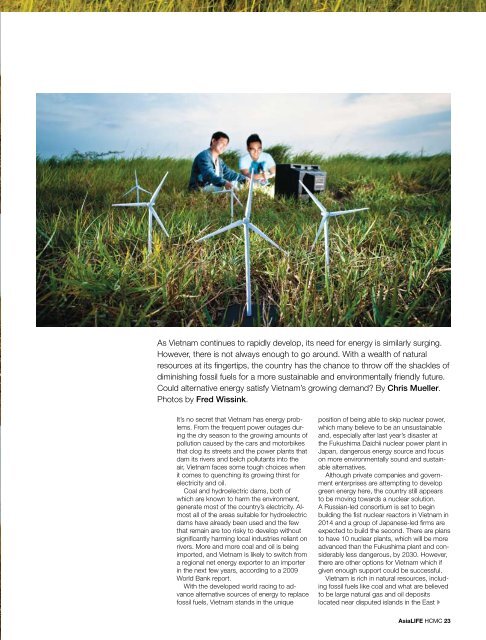Create successful ePaper yourself
Turn your PDF publications into a flip-book with our unique Google optimized e-Paper software.
As Vietnam continues to rapidly develop, its need for energy is similarly surging.However, there is not always enough to go around. With a wealth of naturalresources at its fingertips, the country has the chance to throw off the shackles ofdiminishing fossil fuels for a more sustainable and environmentally friendly future.Could alternative energy satisfy Vietnam’s growing demand? By Chris Mueller.Photos by Fred Wissink.It’s no secret that Vietnam has energy problems.From the frequent power outages duringthe dry season to the growing amounts ofpollution caused by the cars and motorbikesthat clog its streets and the power plants thatdam its rivers and belch pollutants into theair, Vietnam faces some tough choices whenit comes to quenching its growing thirst forelectricity and oil.Coal and hydroelectric dams, both ofwhich are known to harm the environment,generate most of the country’s electricity. Almostall of the areas suitable for hydroelectricdams have already been used and the fewthat remain are too risky to develop withoutsignificantly harming local industries reliant onrivers. More and more coal and oil is beingimported, and Vietnam is likely to switch froma regional net energy exporter to an importerin the next few years, according to a 2009World Bank report.With the developed world racing to advancealternative sources of energy to replacefossil fuels, Vietnam stands in the uniqueposition of being able to skip nuclear power,which many believe to be an unsustainableand, especially after last year’s disaster atthe Fukushima Daichii nuclear power plant inJapan, dangerous energy source and focuson more environmentally sound and sustainablealternatives.Although private companies and governmententerprises are attempting to developgreen energy here, the country still appearsto be moving towards a nuclear solution.A Russian-led consortium is set to beginbuilding the fist nuclear reactors in Vietnam in2014 and a group of Japanese-led firms areexpected to build the second. There are plansto have 10 nuclear plants, which will be moreadvanced than the Fukushima plant and considerablyless dangerous, by 2030. However,there are other options for Vietnam which ifgiven enough support could be successful.Vietnam is rich in natural resources, includingfossil fuels like coal and what are believedto be large natural gas and oil depositslocated near disputed islands in the Eastasialife HCMC 23















